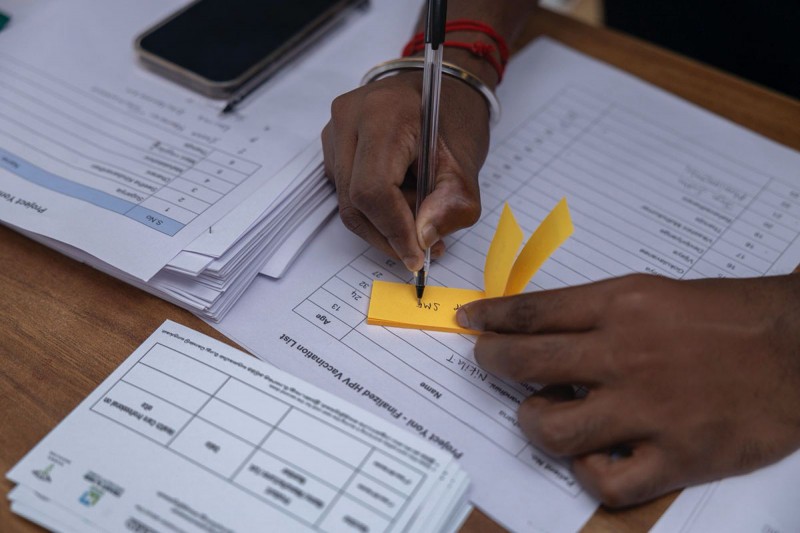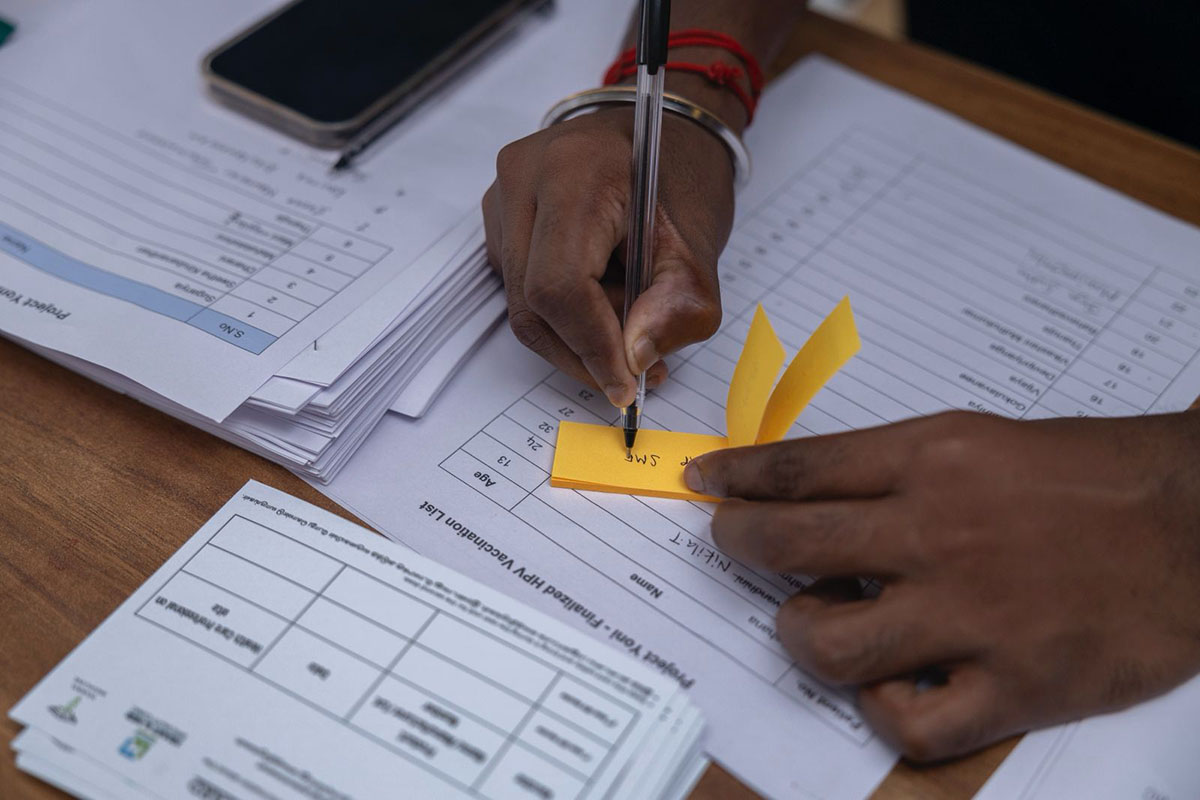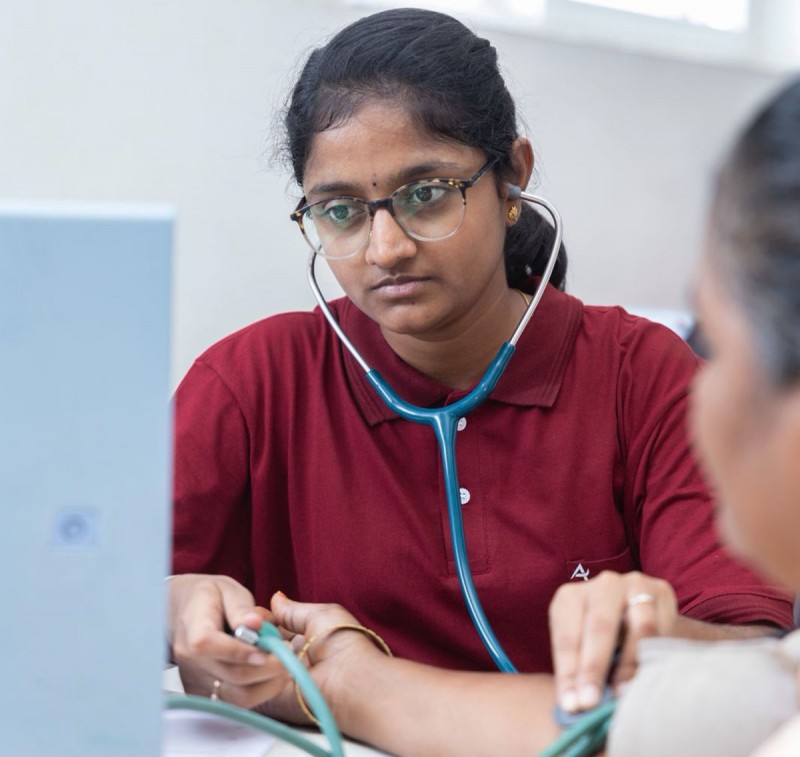Dipshikka Eneyan ’27, a Harpur Fellow, went to India this past summer for a vaccination program. There, the biochemistry major on the pre-med track provided public health education and free HPV vaccinations to patients in need.
When on campus, Eneyan is part of the Binghamton Bhangra Dance Team and the Henna Club. She is also a programs associate for Harpur Edge, which provides students with resources and support for professional, intellectual and personal development.
“Our Harpur Fellows program is always thrilled to help Harpur College students dream big about community service project proposals that work with community members both abroad and domestically to improve the world for and with others,” Harpur Edge Director Erin Cody said.

Dipshikka Eneyan offered health education in India as part of her Harpur Fellowship project. Image Credit: Provided.

Dipshikka Eneyan offered health education in India as part of her Harpur Fellowship project. Image Credit: Provided.
×
This was a passion project for Eneyan, who is dedicated to helping individuals in underprivileged communities in India, her home country. She worked alongside physicians, a local health organization and with medical students from Tiruppur and Coimbatore medical colleges. We talked to her about her experiences.
What was the process of becoming a Harpur fellow?
I wasn’t really sure if I was going to do Harpur Fellows; I was still a first-year student when I found out about it. One of my close friends, a senior at the time, was telling me about her project; she went to the Philippines. Her target was giving underprivileged communities clean water. I thought it was something that was out of reach for me, but I talked to the other fellows and started realizing I could also do it.
When the application process began, I had no idea what I wanted to do. I did want something that was STEM-focused and that I could build on in the future. I talked to my dad, and he talked to people in India. I knew I wanted to do it in India because that’s where I’m from and I know people there. I talked to my dad’s cousin’s wife and she connected me with different doctors and students of hers. I landed on this organization called Namma Medicine. They are a group of medical students that connect with medical colleges nearby and help with HPV vaccinations, cervical cancer trials and more. They work in the Philippines too, because that’s where some of their medical colleges are.
It took me months to even get an idea of what I wanted to do. Finally, I applied in January. I would call them about every other week to touch base. I then had the interview, and it was scary — I won’t lie — but I’m so glad I did it. It was amazing.
Your project was a vaccination program in India. What was your experience like?
I loved every second of it. It was a month-long project because we had to do two doses of vaccines, and we also needed to do educational workshops. We needed to make sure whatever I printed in English — consent forms, IRBs, everything that was related to the project — I had to translate into the native language. That took a lot of time, and there were so many things that I had to do in between.
My whole family came — my sister, my dad, all my aunts and uncles. Each of the medical students’ parents came as well. It felt like a whole community. We made food and made sure everyone was well fed. I didn’t even know that they were going to do this, but they printed out posters and banners, and they also had little awards for us. It was so cute since the owner of the hospital provided all of those goods for me and my family. I shook his hand. He was amazing, really sweet.
Yes, I was the one who donated the money toward my project, but it was a community effort. They even wanted us to come back to do this again. I still remember some girls coming up to me and my parents. They shook our hands and they thanked us over and over, saying how they would have never gotten that opportunity to get something like this if it wasn’t for me and my family. It was really cool to be able to have that impact on people.
What would you say you learned or took away from this experience?
I learned that opportunities like this, especially at Binghamton, are available to anyone. You just need to put yourself out there. I never thought I would do Harpur Fellows because it felt so out of reach; $4,000 was a lot of money. I decided I should try anyway, and I’m so glad I did. It’s not major-specific, so anyone can do it, and I highly recommend it to all students.
Did you face any challenges throughout your time there?
Yes, there were a lot of challenges. There were timing issues. The lead doctor, a medical student who I was speaking to, was in the Philippines because he had a project over there. He wasn’t in India for my project, but we were on call with him the whole time. There were multiple other doctors, so it wasn’t just me, but it was still challenging without him.
Another challenge was getting enough supplies for vaccinations and making sure that we had enough doses. Vaccinations depend on age; as you get older, you need two doses, while children only need one. We had to make sure that we had enough money to get all of the material, and I had to section it off. We also did Pap smears, so I had to make sure we had enough supplies for that as well. We did screenings beforehand, so I had to make sure everything was set and everything came in on time.
We had a hospital, thankfully, so I didn’t need to worry about that. It was a community effort. Whatever challenges I came by, someone else would always be there to help me through it.
Do you have any advice for other students that might be interested in becoming a Harpur Fellow?
Make sure you do everything on time. By on time, I mean months ahead because you need to make sure you plan your project perfectly. There will always be mistakes, and there are always going to be bumps in the road. You need to go slow and prepare for that beforehand.
I would say start early, and make sure you talk to people and make connections. Find organizations who are going to work with you because you can’t just be a one-man show. It’s not going to work in the long run, especially if you’re doing a large-scale project. Make sure you have people, make sure you have safety nets and make sure you have a Plan B. Start early and you’ll do fine. And of course, if you have any questions, come to Harpur Edge for more information.
What would you say was the most memorable part of your experience?
The most memorable part of my project was when the girls came up to me and my family to thank us. They were students, definitely younger than me. They came up to my mom and my dad first to shake their hands and thank them, then they did the same to me. I thought that was really sweet because they saw it as a community effort and a family project instead of just me doing everything; they appreciated my whole family. It made me cry because I was so happy about it. I’m so glad that I got to be a part of this opportunity and was able to help so many people.

